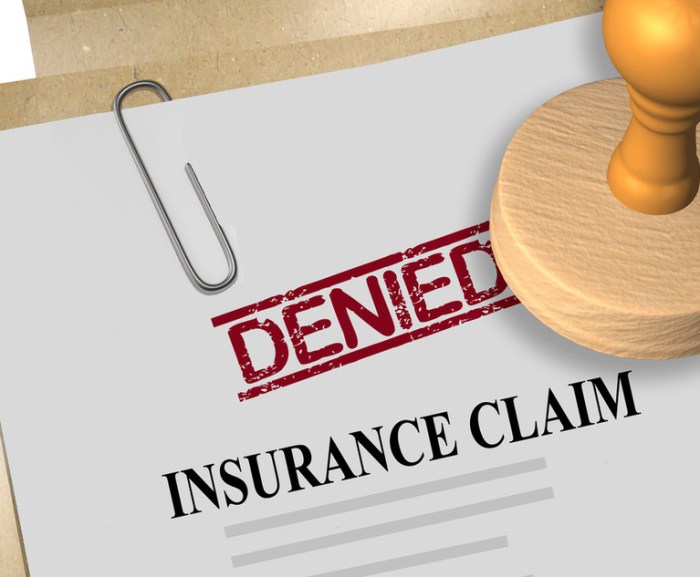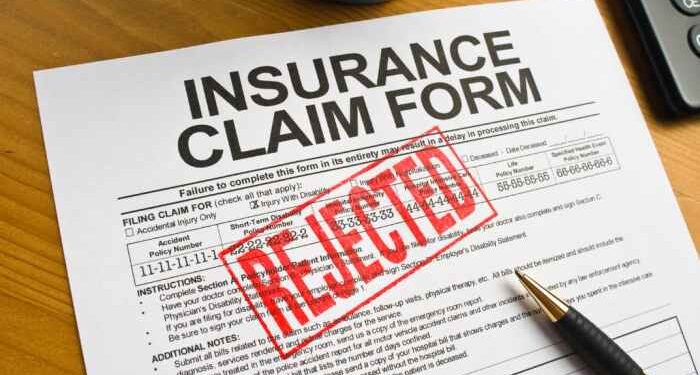Delve into the intricacies of insurance claims with a focus on the top reasons they might get denied. This article aims to shed light on the nuances of claim processing, offering valuable insights to help you navigate the complexities of insurance coverage.
Explore the key factors that could potentially lead to claim denials and discover practical tips to safeguard your claims from being rejected.
Common reasons for insurance claim denials

Insurance claim denials can be frustrating and stressful, but understanding the common reasons behind them can help you avoid potential pitfalls. Here are some of the most frequent reasons why insurance claims get denied:
Lack of documentation
One common reason for claim denials is inadequate documentation. Insurance companies require detailed documentation to support your claim, such as receipts, medical records, and police reports. Without proper documentation, your claim may be denied.
Pre-existing conditions
Claims related to pre-existing conditions may be denied if the insurance company determines that the condition was known prior to obtaining the policy. It's essential to disclose all pre-existing conditions when applying for insurance to avoid claim denials later on.
Policy exclusions
Insurance policies often have specific exclusions that Artikel what is not covered. If your claim falls under one of these exclusions, it may be denied. It's crucial to review your policy carefully to understand what is and isn't covered.
Missed deadlines
Missing deadlines for filing a claim or submitting required documentation can lead to claim denials. It's important to be aware of the deadlines specified in your policy and adhere to them to avoid potential denials.
Incorrect information
Providing inaccurate or incomplete information on your claim form can result in denial. Make sure to double-check all information before submitting your claim to ensure accuracy and prevent potential denials.
Lack of documentation
Proper documentation is crucial when it comes to insurance claims. Without the necessary paperwork to support your claim, insurance companies may deny your request for compensation. It is essential to have all your documents in order to ensure a smooth claim processing experience.
Importance of Proper Documentation
- Policy details: Make sure you have a copy of your insurance policy that clearly Artikels what is covered and what is not.
- Proof of loss: Provide evidence of the damage or loss incurred, such as photos, receipts, or invoices.
- Medical records: If your claim involves medical expenses, ensure you have medical reports and bills to support your claim.
- Police reports: In case of accidents or theft, having a police report can strengthen your claim.
Tips for Organizing and Submitting Documents
- Keep all documents in a safe and accessible place to avoid misplacement.
- Make copies of all documents before submitting them to the insurance company.
- Label each document clearly to indicate what it is and its relevance to the claim.
- Submit all required documents together to prevent delays in claim processing.
Impact of Missing or Incomplete Documentation
- Claim denial: Insurance companies may reject your claim if they find the documentation insufficient or lacking.
- Delay in processing: Missing documents can lead to delays in processing your claim, causing inconvenience and financial strain.
- Lack of evidence: Without proper documentation, you may not be able to prove the legitimacy of your claim, jeopardizing your chances of receiving compensation.
Policy coverage limitations
Policy coverage limitations play a significant role in insurance claim denials. Understanding the specific terms and conditions Artikeld in your policy is crucial to avoid claim rejections. Let's delve into common scenarios where policy limitations can lead to claim denials and the importance of reviewing policy details before filing a claim
Scenarios where policy limitations may come into play
- Pre-existing conditions not covered: Some insurance policies may exclude coverage for pre-existing conditions, leading to claim denials if the condition is related to the claim.
- Exceeding coverage limits: If the cost of the claim exceeds the coverage limits specified in the policy, the insurance company may deny the claim for the additional amount.
- Non-covered perils: Certain policies may have exclusions for specific perils such as floods, earthquakes, or acts of terrorism, resulting in claim denials if the loss is due to these events.
Importance of reviewing policy details
- Prevention of claim denials: By thoroughly reviewing your policy details, you can identify any potential limitations or exclusions that may impact your claim eligibility.
- Understanding coverage scope: Knowing the extent of coverage provided by your policy helps you make informed decisions and avoid surprises when filing a claim.
- Opportunity for adjustments: Reviewing policy details allows you to make any necessary adjustments to your coverage to ensure adequate protection for potential risks.
Filing errors and inaccuracies

When it comes to insurance claims, even the smallest filing error or inaccuracy can lead to claim denials. These mistakes can result in delays in processing your claim or outright rejection by the insurance company. It is crucial to ensure that all information provided is accurate and complete to avoid any issues with your claim.
Guide on How to Correctly Fill Out Claim Forms
- Double-check all personal information such as your name, address, and contact details to ensure accuracy.
- Provide detailed and specific information about the incident or damage being claimed.
- Attach any necessary documentation, such as receipts, estimates, or photographs, to support your claim.
- Review the policy coverage limitations to understand what is included and excluded from your claim.
Common Mistakes When Filing Claims
- Providing incomplete or inaccurate information on the claim form.
- Missing deadlines for filing the claim or submitting required documentation.
- Not disclosing previous claims or incidents that may impact the current claim.
- Exaggerating the extent of damage or loss to try to maximize the claim amount.
The Importance of Double-Checking Information
Double-checking all information provided on the claim form is crucial to preventing claim denials. By verifying the accuracy and completeness of your submission, you can avoid potential errors that could lead to claim rejection. Taking the time to review and confirm all details can make a significant difference in the outcome of your insurance claim.
Outcome Summary
By unraveling the mysteries behind insurance claim denials, you can empower yourself to make informed decisions when dealing with insurance providers. Armed with knowledge and foresight, you can steer clear of common pitfalls that often result in claim rejections.
Q&A
What should I do if my insurance claim is denied?
If your claim is denied, you can first review the denial letter to understand the reasons. You may then appeal the decision, provide additional documentation if needed, or seek assistance from a consumer protection agency.
Is it common for insurance claims to be denied?
While not all claims are denied, it is not uncommon for insurance companies to deny claims due to various reasons such as lack of coverage, documentation errors, or policy limitations.
How can I prevent my insurance claim from being denied?
To avoid claim denials, ensure you understand your policy coverage, submit all required documentation accurately, and double-check your claim forms for any errors before submission.



